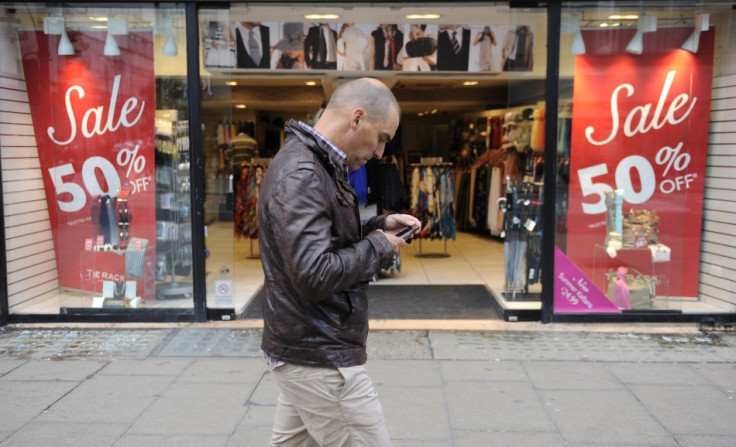UK Recession: Rising Cost of Rent and Everyday Items Will Kill Off Chances of Consumer-Led Recovery

Latest data from the rental market reveals the increasing burden of accommodation costs faced by Britons juggling their finances and undermines the government's view that sharply falling inflation will boost consumer spending in the second half of the year to pull the country out of recession.
In all but one region of Britain, LSL Property Services' monthly buy-to-let index indicated that rent costs rose. In London they reached a record high.
"The sheer weight of tenant demand continues to push up rents across the country," David Newnes, director of LSL Property Services, said.
"Lending criteria remains tight and the number of mortgages given to first‐time buyers - especially those without substantial deposits - is still a long way from the level seen before the credit crunch.
"With higher rents and the growing cost of living eroding the private rented sector swelling by 262,000 households a year."
Overall rent increased by an average of 0.9 percent. The South West was the lone faller at a 0.3 percent drop.
Bloated UK household bills
These figures add to the ever-bloating bills of British households and expose the government's flawed assumption that a falling headline inflation figure - CPI fell sharply in June to 2.4 percent - will ultimately lead to a boost in consumer demand and subsequent second half growth for the UK economy.
"Inflation has more than halved since September, meaning a little less pressure on family budgets," Chloe Smith, economic secretary to the Treasury, said after the Office for National Statistics (ONS) released the monthly CPI rate.
"This lower inflation should support high street spending and growth in the economy in the months to come."
Smith was echoing the conclusion of a report by accountancy firm Ernst & Young that forecast an "Indian summer" of growth for the UK economy, fuelled by consumer spending in the wake of falling inflation.
"Inflation is now coming back to heel, helped by the chancellor's decision to postpone the increase in fuel duty, falling energy and commodity prices, plus tax changes dropping out of the calculation," Peter Spencer, chief economic advisor to the Ernst & Young ITEM Club, said.
"The boost to household finances and the subsequent pick-up in spending should be enough to push the UK back into positive territory this year, but don't expect a consumer-led recovery further out."
Everyday item prices inflating
From the top line of falling inflation this appears to be true, but it belies the data used to compile the headline rate showing that the prices of everyday, essential items are going up or not moving at all.
Breads and cereals prices grew 0.6 percent in June compared to the previous month, reported the ONS.
Milk, cheese and eggs cost 0.2 percent more. Fruit increased by 1.2 percent in price, while vegetables went up 1.5 percent.
People who fuel themselves through a working day on hot drinks have seen coffee, tea, and cocoa prices grow by 3.1 percent. A cigarette on that tea break will cost you, with smokers paying an extra 0.2 percent for tobacco.
Curing your ailment just got pricier, with a 1.3 percent increase in pharmaceutical product prices.
Home maintenance and repair costs are up 0.3 percent, while the goods and services need to carry out this work have gone up 0.5 percent.
Rent stayed the same, as did electricity and gas bills. Travelling to work by rail became more expensive by 0.2 percent. Your dog and cat cost you more to look after, with pet costs rising by 0.2 percent.
All of these price increases come on top of real-terms falling wages. Pay data from the ONS shows that salaries only grew by 1.8 percent across the year, still outpaced by inflation.
Hard-pressed households have seen their disposable income eroded. Rising prices on the essentials will eat further into people's finances.
In fact the June fall in inflation was driven by heavy discounting from clothing retailers, desperate to shift their summer lines of stock amid dampened consumer demand and a wash-out summer of bad weather.
Garments prices dropped 4.9 percent, while footwear fell 1.7 percent.
Record rainfall, flooding, high winds, and low temperatures look set to extend into July and cause more misery for British retailers.
"The prolonged wet weather we have had through the summer has effectively suffocated demand for an awful lot of stock many retailers have in store, whether that is summer clothing, summer shoes, barbecue equipment or gardening gear," Sarah Cordey, spokeswoman for industry representatives the British Retail Consortium (BRC), told IBTimes UK.
Despite the heavy discounting June retail sales grew by just 0.1 percent, as sign that there is little retailers can do to encourage consumer spending.
Instead they must wait until the macroeconomic picture improves, with uncertainty in the financial crisis-it eurozone looming over the UK.
Eurozone crisis looms over UK consumers
A catastrophe in the eurozone, such as a disorderly break-up of the single currency area, would likely send many British firms bankrupt and throw thousands more people out of work.
Britain's biggest trading partner is the eurozone.
Banks are seemingly unwilling to lend to businesses and consumers because of their risk exposure to the eurozone.
This, argues the government, is the reason the UK economy fell back into recession at the beginning of the year.
With no sign of an end to the eurozone crisis, and private industry data suggesting the recession will head into its third consecutive quarter, the wider economic environment is unlikely to improve soon.
Mixed with rising prices on essential goods, wages that rise slower than inflation, and job fears, consumer demand will probably remain subdued for some time and not lead a second half return to growth for the UK economy.
© Copyright IBTimes 2025. All rights reserved.






















